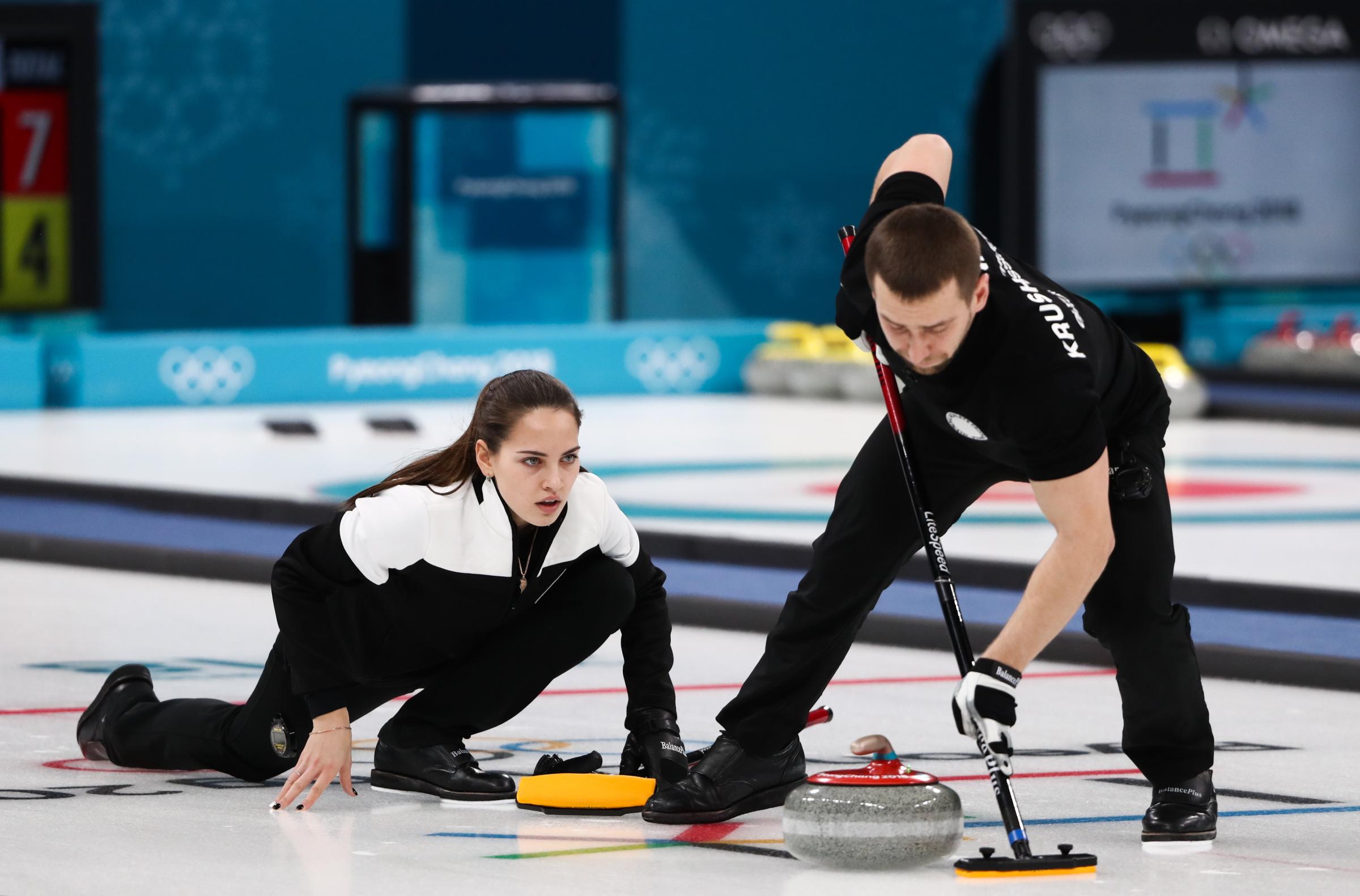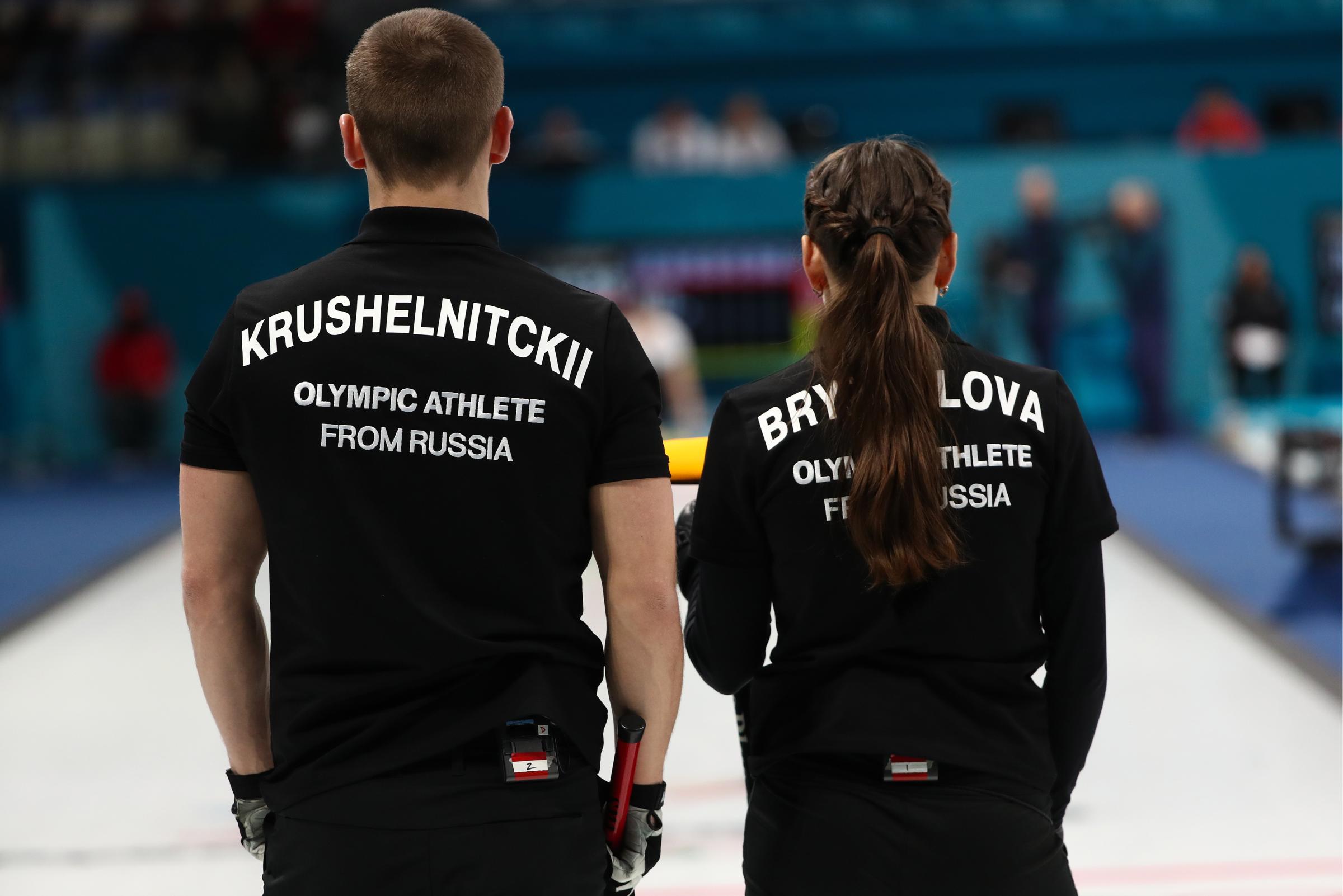No Olympics feels complete without some sort of juicy scandal. This year, leave it to the curlers to create one.
At the 2018 Winter Olympic Games, a positive drug test from Russian curler Alexander Krushelnytsky — yes, a curler apparently doped — has kept PyeongChang buzzing. Krushelnytsky won bronze in the mixed doubles curling event along with his wife, Anastasia Bryzgalova.
Here’s what you need to know about the brewing Russian curling doping controversy.
Why is a Russian curling doper creating such chaos?
Normally, if a curler was caught taking performance enhancing drugs, everyone would enjoy a good guffaw and move on. Curling’s a gentle game, often played over beers (outside the Olympics, anyway). The sport requires no brute strength, and it’s not a heart-taxing endurance event like a marathon.
Still, watching stones slide down the ice for hours can test your patience. And the furious sweeping, curlers insist, requires fitness.
Krushelnytsky, however, is Russian. That complicates things, especially at these PyeongChang Olympics. Russia operated a state-sponsored doping scheme at the Sochi Olympics, and the International Olympic Committee considered kicking the country out of the 2018 Olympics. Technically, Russia isn’t even here. Its team is called the Olympic Athletes from Russia, or OAR, and it competes under the Olympic flag. The Olympic anthem, rather than the Russian national anthem, would play at medals ceremonies (OAR has yet to win a gold).
Any Russian athlete “disqualified or declared ineligible for any Anti-Doping Rule Violation” in his or her past was deemed ineligible for the Olympics. Russians were also subject to special drug testing this year. In January, the International Olympic Committee issued “conduct guidelines” for the OAR delegation. Athletes, for example, can’t display the Russian flag at the Olympic village, though they can hang it in their bedrooms.
The IOC said Russia could possibly wear its uniforms, and fly its flag, at the closing ceremonies, providing these conditions for participation are “fully respected.” Krushelnytsky’s doping violation puts the Olympic reinstatement of Russia proper in jeopardy.

What was in Alexander Krushelnytsky’s system?
Meldonium, the same substance that earned tennis star Maria Sharapova a 15-month suspension.
According to the U.S. Anti-Doping Agency, meldonium “has been described as having performance-enhancing benefits in sport, including an increase in endurance, improved rehabilitation following exercise, and enhanced activations of the central nervous system.”
Krushelnytsky has reportedly told Russian officials that a spurned teammate who was not selected for the Olympics spiked his drink.
If Alexander Krushelnytsky loses his medal, who gets the bronze?
The Court of Arbitration for Sport has confirmed that it’s taking up Alexander Krushelnytsky’s case at the request of the IOC. If the OAR curling team is stripped of its medals, Magnus Nedregotten and Kristin Skaslien of Norway are in line to earn the bronze.
Norway already sits atop the medals standings — and might be awarded one more.
Who will decide whether Russia flies its flag at the Closing Ceremony?
The IOC created something called the OAR Implementation Group to monitor Russia at the Games. It consists of group chair Nicole Hoevertsz of Aruba, an IOC executive board member who participated in synchronized swimming at the 1984 Olympics in Los Angeles, Danka Bartekova of Slovakia, a former Olympic shooter, and Christophe De Kepper of Belgium, IOC director general.

When will the Russia decision be made?
The implementation group will report its opinion to the IOC executive board on Feb. 24, the day before the closing ceremonies. Expect an announcement that day.
What impact will Alexander Krushelnitsky’s positive test play in the decision?
Doping doesn’t help Russia’s cause. The positive test, however, likely won’t count as an automatic disqualifier. At a Feb. 6 IOC session, Hoevertsz said “individual incidents” would not necessarily result in the continuation of the ban.
“It is not simply about the behavior of the team here — although that is an important element,” IOC spokesperson Mark Adams writes in an email to TIME. The implementation group, Adams says, will consider “whether the letter and the sprit of the law have been obeyed.”
As for the letter of the law, it might come down to how seriously the IOC treats the word “fully.” In order for Russia to even participate under a neutral flag, its conditions had to be “fully respected.” Each athlete at the Olympics had to be clean. One, apparently, wasn’t. That’s not “full” respect.
The spirit, however, provides a trickier challenge. If an overwhelming majority of Russia’s athletes passed their drug tests, and didn’t wave the Russian flag around town or otherwise try to circumvent the OAR rules, should they be punished for one bad actor?
Still, a country already caught operating a massive doping scheme apparently doped again. Even for the IOC, which “banned” Russians from the Olympics but still welcomed them to PyeongChang, this curling scandal could prove too much to bear.
More Must-Reads from TIME
- Donald Trump Is TIME's 2024 Person of the Year
- Why We Chose Trump as Person of the Year
- Is Intermittent Fasting Good or Bad for You?
- The 100 Must-Read Books of 2024
- The 20 Best Christmas TV Episodes
- Column: If Optimism Feels Ridiculous Now, Try Hope
- The Future of Climate Action Is Trade Policy
- Merle Bombardieri Is Helping People Make the Baby Decision
Write to Sean Gregory/PyeongChang at sean.gregory@time.com